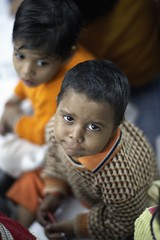 When I suggested that we begin environment awareness classes with the tiny tots of pwhy, many were sceptical but when Ma’am decrees what can you say! So the classes begun. Every day for about a quarter of an hour the creche kids were told about why water should not be wasted, why plastic was bad for our planet, why trees were needed and so on. Slowly the initially reluctant teachers got motivated and the children were told what to do in case they saw something that was not right. For instance, they if they saw a tap leaking, the teacher suggested they tell an adult and ensure that the tap was closed properly.
When I suggested that we begin environment awareness classes with the tiny tots of pwhy, many were sceptical but when Ma’am decrees what can you say! So the classes begun. Every day for about a quarter of an hour the creche kids were told about why water should not be wasted, why plastic was bad for our planet, why trees were needed and so on. Slowly the initially reluctant teachers got motivated and the children were told what to do in case they saw something that was not right. For instance, they if they saw a tap leaking, the teacher suggested they tell an adult and ensure that the tap was closed properly.
The children listened as they always do, with great concentration. Yet one wondered how much they really imbibed. I was confident that their little brains did process things and that time would tell whether I had been right or not.
Imagine my joy when our creche in charge told me that little Raj, all of 3 years had become a little water warrior. She recounted how a few days back he had gone to the bathroom and come back all agitated mumbling ‘water leak’ ‘water leak’ and tugging at the teacher’s kurta. At first she did not understand what it was all about and even chided him. But Raj did not let go and pulled her pointing towards the bathroom. The teacher followed him and found him showing her the tap that was dribbling a little. She closed it tightly and Raj all smiles clapped in delight. Since that day Raj never fails to point out a leaking tap if he sees one. I wonder whether he does the same at home.
Children are very receptive to such matters. At the women centre we now have quite a few water warriors who have evolved their own ways to save water. Some days back there was just half a can of drinking water left in the centre. Actually our coordinator had hidden the rest as he was irked at the children who threw as much as they drank as they fooled around or spent large amounts of clean drinking water washing the glass after each use. So that day there was no water to drink. When the children asked for water to drink, they were simply told there was none left because it has been wasted unnecessarily. The day was very hot and the children thirsty. The children went back to their class. When it was time to go home, they did not leave but spent time discussing the water issue. Some time later they came to the coordinator and told him they had found a solution. They asked the coordinator to stop allowing children to come and drink at any time but to begin water breaks when all those who needed a drink would go to where the drinking water cans were kept and have a drink.
The new ‘rule’ was adopted and from the next day the centre had drinking breaks. The children would come down and one of them would stand and supervise matters. Children had to drink without placing their lips on the glass so that one did not need to wash it each time, and the supervisor of the day was the one who filled each glass carefully, without any spill and ensured that everyone finished their glass. The system is now in place and works to perfection.
I have always held that change of any kind can only come if we include the smallest, the poorest and the less privileged as an equal partner. Once again I was proved right, or so I would like to believe.

